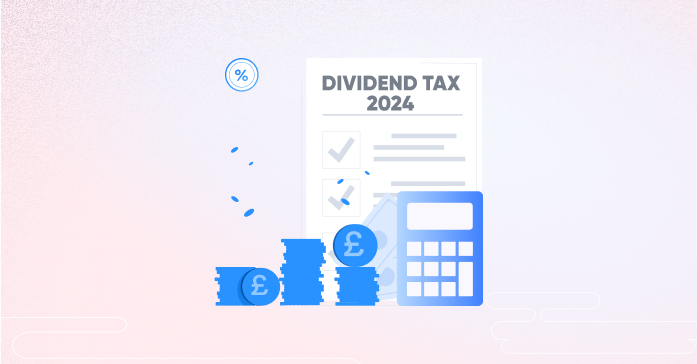Investing in stocks and owning shares in companies can be an exhilarating and rewarding journey! But did you know that understanding the tax implications of receiving dividends is key to maximizing your returns? Whether you’re an enthusiastic investor, a small business owner, a savvy financial advisor, or a director of a limited company, grasping how dividend tax works can save you money and keep you on the right side of HMRC regulations. Join us in this engaging guide as we explore everything you need to know about dividend tax in 2024!
What is Dividend Tax?
Dividend tax refers to the tax levied on income earned from dividends, which are payments made by a company to its shareholders from its profits. When a company generates profit, it has two options:
- reinvest the money back into the business or
- distribute it to its shareholders as dividends.
For investors, dividends can serve as a reliable source of income. However, it's important to remember that this income is subject to taxation. Understanding dividend tax is crucial for anyone looking to maximize their investment returns. By knowing how dividends are taxed, you can better plan your investment strategy and manage your overall tax liability.
Dividend Tax Rates for 2024/25
Dividend tax rates play a crucial role in determining how much tax you'll pay on your investment income. These rates can change based on your total taxable income. For the tax year 2024/25, here’s a breakdown of the dividend tax rates:
- Basic Rate Taxpayers (income up to £50,270): 8.75%
- Higher Rate Taxpayers (income between £50,270 and £150,000): 33.75%
- Additional Rate Taxpayers (income over £150,000): 39.35%
These rates apply to the portion of your income that falls within each tax band, after considering your personal allowance and any other income sources. Understanding these rates is essential for effective tax planning and maximizing your investment returns.
Dividend Allowance 2024/25: What You Need to Know
The dividend allowance is a tax-free threshold that allows you to earn a certain amount from dividends each year without incurring tax. For the tax year 2024/25, this allowance is set at £500. This means you won't have to pay tax on the first £500 of your dividend income, no matter what tax bracket you fall into.
Understanding the dividend allowance is essential for maximizing your investment returns. Ensure you stay informed about this tax-free amount to make the most of your earnings from dividends!
How Much Tax Will I Pay on My Dividends?
Curious about how much tax you'll owe on your dividends? Let’s break it down step by step!
- First, add up your total income—this includes your salary, interest, and those dividends.
- Next, subtract your personal allowance (£12,570 for the 2024/25 tax year) from that total.
- Now, it’s time to apply the right dividend tax rates to your remaining income within each tax band.
Here’s a real-world example to clarify:
Imagine your total income is £40,000, with £10,000 coming from dividends. After deducting your personal allowance of £12,570, you’ll have a taxable income of £27,430. Good news: the first £500 of your dividend income is tax-free thanks to the dividend allowance! For the remaining £8,000, you’ll be taxed at the basic rate of 8.75%, which brings your dividend tax liability to £700.
Understanding your tax on dividends doesn’t have to be dull. With the right info, you can navigate it easily!
Understanding the Dividend Tax Allowance for 2024-25
The dividend tax allowance for the 2024/25 tax year is set at £500, unchanged from previous years.
This allowance means you can receive up to £500 in dividend income without incurring any tax liabilities. However, any dividends exceeding this limit will be taxed according to the applicable dividend tax rates, which vary based on your overall income level.
Stay informed about the dividend tax allowance to maximize your investment earnings and plan your finances effectively!
How to Calculate Your Dividend Tax Liability
Understanding your dividend tax liability doesn't have to be daunting! Here’s a simple, step-by-step guide to help you navigate the process:
- Gather Your Income Sources: Start by adding up all your income this includes your salary, interest, and, of course, your dividends.
- Calculate Your Taxable Income: Next, subtract your personal allowance from this total to find out what portion is taxable.
- Apply the Tax Rates: Now, it’s time to apply the dividend tax rates to the income within each tax band.
Let’s break it down with an example: Imagine your total income is £60,000, which includes £5,000 from dividends. After subtracting your personal allowance of £12,570, you’ll have a taxable income of £47,430. Remember, the first £500 of your dividend income is tax-free! The remaining £3,000 is taxed at 8.75% within the basic rate band, leading to a tax liability of just £262.50.
By following these steps, you can confidently calculate your dividend tax and stay on top of your finances!
Director Dividends: A Guide for Shareholder Directors
If you're a company director and a shareholder, you have the opportunity to receive dividends from your limited company. To make the most of your dividend income while ensuring compliance with tax regulations, keep these essential points in mind:
- Dividends from Company Profits: Remember that dividends can only be distributed from your company's profits. It's crucial to assess your financial health before declaring dividends.
- Ensure Sufficient Profits: As a director, you must confirm that your company has enough profits to cover any dividend payments. Proper financial management is key to sustainable dividend distribution.
- Manage Dividend Payments Wisely: Make sure to keep track of your dividend payments to avoid exceeding the £500 dividend tax allowance. This will help you minimize your tax liabilities.
By adhering to these guidelines, you can effectively optimize your dividend income while remaining compliant with the UK tax laws. Understanding the intricacies of director dividends can lead to better financial planning and increased profitability for your company.
Understanding Tax on Dividends vs. Salary: Which Is Better for You?
When choosing between paying yourself a salary or taking dividends from your company, it's essential to understand the tax implications of each option. Salaries are subject to income tax and National Insurance contributions, which can reduce your overall income. On the other hand, dividends are taxed at lower rates and do not incur National Insurance, making them a more tax-efficient choice for many business owners.
However, it’s important to note that dividends can only be distributed from your company's profits. Therefore, it’s crucial to carefully balance your compensation strategy to maximize tax efficiency and ensure compliance with tax regulations. By considering the benefits and drawbacks of both salaries and dividends, you can make informed decisions that enhance your financial outcomes.
Maximizing Your Dividend Income
Want to make the most of your dividend income? Here are some friendly tips to help you out:
- Take advantage of your dividend allowance by distributing dividends up to the tax-free threshold.
- Consider spreading your dividend payments across different tax years to stay within those lower tax bands.
- Keep track of all your dividend payments and company profits to ensure you’re on the right side of HMRC regulations.
By following these strategies, you can boost your dividend income while keeping your tax liability in check. Happy investing!
Top Dividend Tax Pitfalls to Dodge!
Navigating the world of dividends can be tricky, but avoiding these common tax mistakes will keep you compliant and help maximize your returns:
- Don’t forget to consider all income sources when figuring out your tax liability-every bit counts!
- Always ensure you’re distributing dividends from company profits; it’s essential for staying on track.
- Keep an eye on those changing dividend tax rates and allowances each year; staying informed is key!
By following these best practices and staying in the loop, you can sidestep these traps and make sure your dividend income is taxed accurately. Let’s make your investment journey smoother!
Future Changes to Dividend Tax
Tax regulations can change, so it's a good idea to stay informed about potential updates to dividend tax rates and allowances. By keeping an eye on government announcements and chatting with a financial advisor, you can stay ahead of any changes that might affect your dividend income.
Conclusion
Understanding dividend tax is crucial for investors, small business owners, financial advisors, and company directors. By keeping up-to-date with current dividend tax rates, allowances, and best practices, you can maximize your dividend income and reduce your tax liability effectively. Whether you receive dividends from personal investments or through your limited company, being proactive in managing your tax obligations can significantly enhance your returns and help you reach your financial goals.
For more insights on dividend tax strategies and personalized guidance, consider booking a consultation with our tax experts. Start optimizing your dividend income today and secure your financial future!













